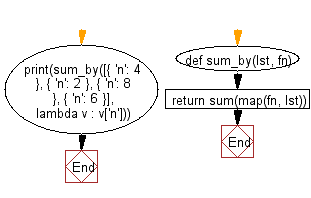Python: Calculate the sum of a list, after mapping each element to a value using a given function
Sum Mapped Values in List
Write a Python program to calculate the sum of a list, after mapping each element to a value using the provided function.
- Use map() with fn to map each element to a value using the provided function.
- Use sum() to return the sum of the values.
Sample Solution:
Python Code:
# Define a function 'sum_by' that takes a list 'lst' and a function 'fn'.
# It calculates the sum of the values obtained by applying 'fn' to each element in the list.
def sum_by(lst, fn):
return sum(map(fn, lst))
# Call the 'sum_by' function with a list of dictionaries and a lambda function.
# The lambda function extracts the 'n' value from each dictionary.
# The function returns the sum of all 'n' values from the list of dictionaries.
print(sum_by([{ 'n': 4 }, { 'n': 2 }, { 'n': 8 }, { 'n': 6 }], lambda v : v['n']))
Sample Output:
20
Flowchart:

For more Practice: Solve these Related Problems:
- Write a Python program to calculate the sum of a list after applying a function that doubles each element.
- Write a Python program to compute the sum of mapped values in a list where each element is transformed to its square before summation.
- Write a Python program to sum a list after mapping each element to its integer representation from a string, handling conversion errors gracefully.
- Write a Python program to calculate the sum and then the average of a list after applying a logarithmic transformation to each element.
Go to:
Previous: Write a Python program to get the minimum value of a list, after mapping each element to a value using a given function.
Next: Write a Python program to initialize and fills a list with the specified value.
Python Code Editor:
What is the difficulty level of this exercise?
Test your Programming skills with w3resource's quiz.
